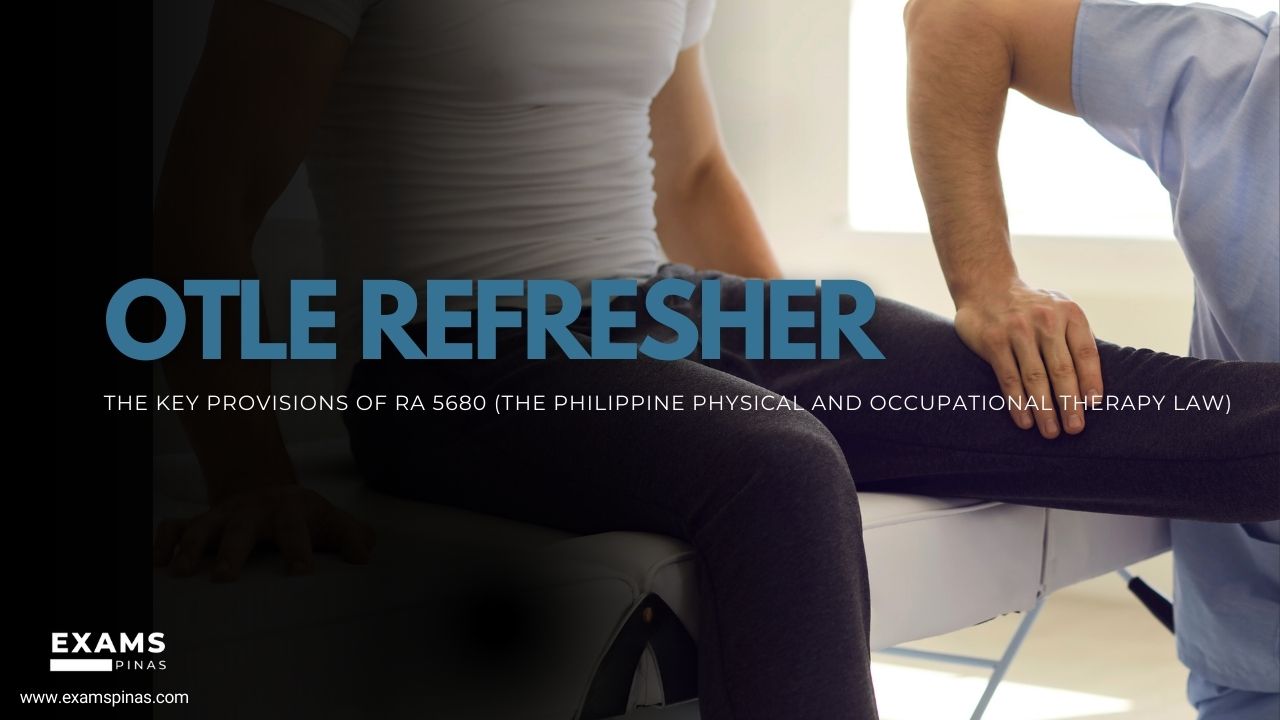RA 5680 established the original regulatory framework for both Physical Therapy and Occupational Therapy in the Philippines, governing everything from the creation of the board to the limitations of practice. Knowing these sections is essential for the Law and Ethics portion of the exam.
1. The Definitions (Sec. 2)
This section clearly sets the scope of practice and the legal identity of the professional.
- Occupational Therapy (OT) Defined: It is described as a paramedical discipline concerned with the administration of medically prescribed treatment in the form of supervised activity (or “occupation”) to persons disabled by disease or injury.
- The OT Objective: To contribute to the disabled person’s independence, improve their emotional, social, and physical well-being, and enhance their ability to care for himself/herself both at home and on the job.
- Occupational Therapist (OTRP): A legally qualified person licensed to practice under this Act who possesses the knowledge and skills to achieve these objectives through the use of creative, manipulative, educational, pre-vocational evaluation, and self-care activities.
2. The Board of Examiners (Sec. 3 & 5)
RA 5680 created the Board of Examiners for Physical Therapists and Occupational Therapists (now the Professional Regulatory Board of Occupational Therapy). Its powers are critical for the profession’s regulation.
| Board Powers and Duties (Sec. 5) | Relevance to Practice |
| Issuance of Licenses | The power to issue, suspend, revoke, or re-issue Certificates of Registration (licenses) is the board’s primary function in controlling who practices. |
| Conduct Examinations | The duty to give examinations to applicants for the practice of OT. |
| Set Standards | The power to study, promote, and improve the conditions of the practice and adopt ethical standards. |
| Educational Oversight | The power to approve the curricula and faculty qualifications of schools offering the OT program (in coordination with CHED). |
3. Requirements and Qualifications (Sec. 11)
These provisions outline who is legally permitted to take the board exam and practice in the Philippines.
- Citizenship: Must be a Filipino citizen or a foreigner whose country permits Filipinos to practice OT (reciprocity).
- Education: Must have a degree in Occupational Therapy from a school, college, or university recognized by the Philippine government.
- Internship: Must have completed at least nine (9) months of clinical internship or practical experience in an accredited training center.
4. Restrictions and Penalties (Sec. 12 & 15)
These are the “don’t do” sections, which protect the public and the integrity of the profession.
Practice Restriction (Sec. 12)
No person shall practice or offer to practice Occupational Therapy in the Philippines without the prescription of a duly registered physician and a valid Certificate of Registration (license) issued by the Board.
ALE Tip: The requirement for a medically prescribed treatment emphasizes the historical context of OT as a profession primarily operating under the medical model in the Philippines.
Prohibited Acts and Penalties (Sec. 15)
The law penalizes those who:
- Practice or offer to practice OT without a valid license.
- Use a fraudulent certificate or falsely impersonate a licensed therapist.
- Penalties: Violation is a misdemeanor, punishable by a fine (not less than $\text{Php } 1,000$ nor more than $\text{Php } 5,000$) or imprisonment (1 to 5 years), or both.
💡 Key Takeaway for the OTLE
RA 5680 establishes that the practice of Occupational Therapy in the Philippines is a regulated profession that requires specific academic qualifications, licensure, and a strong adherence to ethical and professional standards set by the Board.

